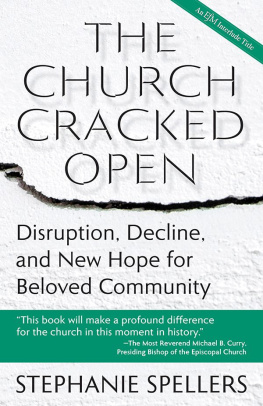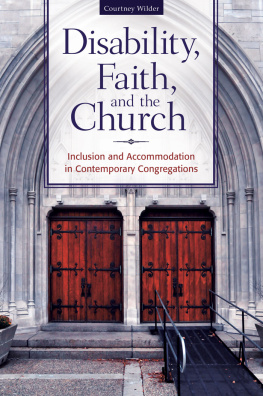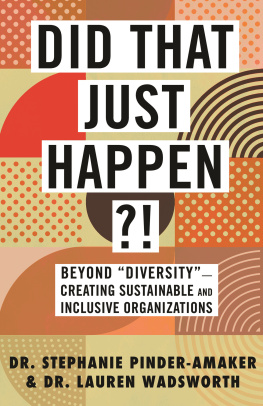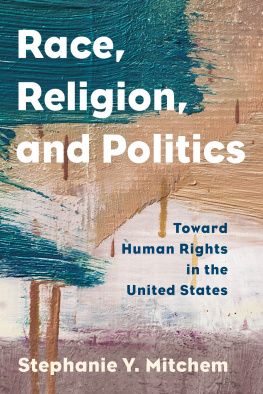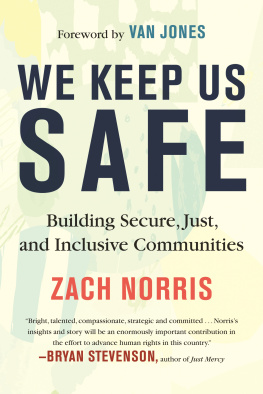Radical Welcome
Advance Praise for Radical Welcome
When the drafters of the 1979 Book of Common Prayer began the work of reshaping the churchs worship experience, one of the first principles they addressed was the need to have the whole community present at the Eucharist. They were clear that adults, elders, and children all needed a place at the table. Perhaps this example from the mid-1940s is the beginning of our churchs on-going struggle with the question of diversity.
Today, addressing the issue of diversity in the life of the church calls us to encounter questions of inclusivity in terms of age, race, culture, sexuality, and class. Because we who by accident of birth enjoy a place of privilege in the life of the church are mostly blind to the expectations we maintain that exclude those not like us, we need the assistance of others to be truly inviting, welcoming, even radically welcoming congregations.
In Radical Welcome, from the perspective of one who has struggled to gain entry, Stephanie Spellers identifies barriers to inclusivity and offers a path for those who would transform their vision of the church as a gathering of all Gods children.
The Rev. Dr. Clayton L. Morris
Liturgical Officer, Episcopal Church Center
Author, Holy Hospitality: Worship and
the Baptismal Covenant
In this book, Spellers provides thoughtful scholarship, wise counsel, and in-depth analysis of rigorous qualitative research. Her ability to define radical welcome in both theological and sociological terms, while avoiding off-putting jargon and clich, makes Radical Welcome a unique resource. This book would be a wise choice for any minister, congregational leader, or Christian who wishes to understandon both the most practical and the most ephemeral levelswhat is required of the community that seeks to live into Christs call that all may be one.
The Rev. Dr. Sarah Birmingham Drummond,
M.Div., Ph.D.
Director of Field Education and Assistant
Professor of Ministerial Leadership
Andover Newton Theological School
STEPHANIE SPELLERS
Radical Welcome
Embracing God, The Other and the Spirit of Transformation

2006 by Stephanie Spellers
All rights reserved.
Library of Congress Cataloging-in-Publication Data
Spellers, Stephanie.
Radical welcome : embracing God, the other, and the spirit of transformation /
by Stephanie Spellers.
p. cm.
Includes bibliographical references.
ISBN-13: 978-0-89869-520-5
ISBN-10: 0-89869-520-1
ISBN 978-0-89869-794-0 (ebook)
1. Non-church-affiliated people. 2. Church work with ex-church members.
3. Evangelistic work. 4. Church growth. 5. Church development, New. I. Title.
BV4921.2.S64 2006
253dc22
2006029171
Church Publishing, Incorporated.
445 Fifth Avenue
New York, New York 10016
www.churchpublishing.org
For my mother, Phyllis Spellers,
my biggest cheerleader and inspiration,
who says she always knew Id write a book someday.
And for my entire family in Frankfort, Kentucky,
who taught me how to swing open the doors
and invite the whole community to the table.
Contents
O ne of my fondest memories is about a parish I served many years ago. It was in the housing projects. It met upstairs over a local caf. I described it as a half-way house because so many of our folks had either left the church and were now half-way back in, or they were halfway out of the church and were just giving it one more try before they gave up. It was a great community. A porous, challenging, engaged community. A place full of unique and extraordinary people.
After reading Stephanie Spellers book, Radical Welcome: Embracing God, The Other and the Spirit of Transformation, I realize that more than a half-way house, my parish was actually a place of radical welcome. We were an experiment in acceptance. I never would have made that connection in quite the same way without the language of radical welcome.
We will consider the rationale for radical welcome, Stephanie writes in the opening to her remarkable book, and then explore the resources people engaged in the movement toward radical welcome told me they found the most essentialand the hardest to find.
And thats just what she does. She gives us a framework and she gives us practical tools. In a step-by-step journey of discovery into what radical welcome is and how it can work, Stephanie offers us a blueprint for planned growth, change and mission. She shows us that there is a great, untapped source of strength for every congregation. It is the presence of The Other within the pastoral neighborhood: that group of persons who stand just beyond the social/cultural threshold of the congregation. Engaging them honestly will not only expand the horizons of the congregation but revitalize it in ways that could never be realized otherwise. In simple language, radical welcome shows us how we need one another, and even more importantly, how we translate that potential into the blessings of a church renewed.
She is also honest about how hard the job will be. This is not a feel good book. It is not about how we should all be nice to strangers at coffee hour. This is a book about the very hard challenges that face any of us when we decide to step outside of our isolation for the sake of the gospel.
To make a commitment to explore the depth of what radical welcome means, we are asked to confront how we all participate in systems of inclusion and exclusion. We are asked to deal with the fact that in practicing radical welcome there is no such place as a neutral space.
In short, Stephanie is calling us to a much more mature and nuanced understanding of what it means for any congregation to truly open its doors to community. It is not a matter of just accepting difference. It is a matter of creating something new. Her book is a resource because it tells the story of how real congregations achieved remarkable results in allowing the chemistry of human cultures to mix more freely to produce a people of faith. This is not theory but practice. It is an articulation of the basic steps that any community of faith would need to take to experience transformation and renewal.
Consequently, this book is that rare combination of deep spirituality and pragmatism. Much like the Holy Scriptures on which it is firmly grounded, Stephanies vision of radical welcome talks about new life for the people of God. The call to take on the challenges of radical welcome is for the growth of the community, not only in numbers, but in spirit, imagination and strength. This is a book about the future envisioned by the gospel, a future that extends the love of Christ in all directions.
I believe that at its heart, radical welcome is about the new definition of evangelism for the twenty-first century. In the past, we have consigned evangelism to the simple exercise of duplication: creating more communities in our own image. In response to the cultural changes of the Civil Rights Movement and up to the present day, we have often spoken of evangelism as though it were sensitivity training for cross-cultural special events. What Stephanie is suggesting is something very different.
Radical welcome is not the welcome wagon. Her direction moves us through the mono-cultural dead end of traditional images of evangelism and beyond the boundaries of polite cultural interaction. It takes us directly to the heart of the nature of evangelism: the transformation of human life from the isolated to the integrated.
Radical welcome is a process. It is a process by which isolated parts of a whole community are brought together in creative and compassionate ways to generate a more integrated, balanced and dynamic mixture. Not a melting pot or a stew of differences, but a community that works well, prays well and plans well together. These communities are grounded in some of the most basic values we share as Gods people. Radical welcome describes how communities stay hospitable, connected, centered, open to conversion, and intentional. These are fundamental qualities for any meaningful congregational experience. They are, in short, what pastors are looking for. What radical welcome offers are methods and practices that bring the gospel alive in communities that work for everyone, not just for the few.
Next page

